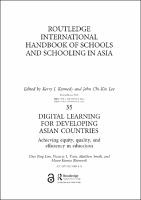Chapter 35 Digital Learning for Developing Asian Countries
Achieving equity, quality and efficiency in education
Author(s)
Kumar Bhowmik, Miron
Ping Lim, Cher
Smith, Matthew
L. Tinio, Victoria
Language
EnglishAbstract
Education – that is, the development of knowledge, skills, and values – is an important means by which to empower individuals in a society. As both a means towards and an outcome of
gaining the capabilities necessary to participate in and contribute to society, education is an
essential enabler in many social aspects, such as economic growth, poverty reduction, public
health, and sustainable development, especially in today’s knowledge society. At the same
time, however, education can still be a social institution that reflects and reproduces the social,
cultural, and economic disadvantages that prevail in the rest of society (Bourdieu & Passeron,
1990). For example, students who are discriminated against socio-culturally
or who are economically
poor are more likely to receive an education that is characterized by inadequate infrastructure,
few qualified teachers and encouraging peers, and outmoded pedagogical practices,
which often results in a lower quality of life.
Keywords
digital learning; asia; education; digital learning; asia; education; Developing country; Intelligent tutoring system; Massive open online course; Race and ethnicity in the United States Census; SustainabilityISBN
9781315694382OCN
1038405514Publisher
Taylor & FrancisPublisher website
https://taylorandfrancis.com/Publication date and place
2018Imprint
RoutledgeClassification
Education


 Download
Download